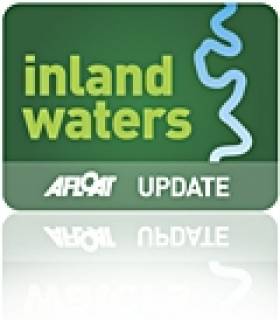Displaying items by tag: Castle Island
Waterways Ireland advises all masters and users of the Erne System in Northern Ireland that the channel east of Castle Island in Enniskillen will be closed from this Wednesday 7 June to 30 September 2023.
This is for the creation of a water activity zone in the area, similar to that created last year. The designated area will be clearly marked by floating buoys.
Access to Castle Museum Jetty will be maintained when approaching from the north of Castle Island.
Mariners should use the navigation channel to the west of Castle Island and proceed at slow speed with minimum wash, adhering to any instructions or displayed signage.
Mariners should also be aware of small non-motorised craft also operating in the navigation, the cross-border body for Ireland’s inland waterways adds.
Erne System: High Water Levels Across System and Restrictions at Castle Island for Power Line Repairs
Waterways Ireland advises masters of vessels and water users on the Erne System that emergency overhead line repair works are planned between Castle Island and the west shoreline on Saturday 25 March.
To enable the repair works to be completed, the navigation channel between Castle Island and the west shoreline of the River Erne will be temporarily closed on Saturday from 10am to 3pm.
Safety boats will be in place for the duration of the repair works. The navigation channel between Castle Island and the east shoreline will remain open.
The cross-border body for Ireland’s inland waterways also warns that the Erne System is currently experiencing high water levels.
Masters of vessels and water users should proceed with additional caution and bear the following in mind when on the water during high-water conditions:
- Air draft is reduced under all bridges and power lines.
- Water velocity is significantly increased.
- Access to jetties can be difficult as gangways and pontoons are elevated.
- Navigation markers, pontoons and jetties may be submerged.
- Mooring lines should checked regularly if it safe to do so.
Waterways Ireland advises all masters and users of the Erne System that the channel east of Castle Island, Enniskillen will be closed from Monday 4 July to the end of September to create a water activity area.
The designated area will be clearly marked by floating buoys. Access to Castle Museum Jetty will be maintained when approaching from the north of Castle Island.
Mariners should use the navigation channel to the west of Castle Island and proceed at slow speed and with minimum wash adhering to any instructions or displayed signage. Mariners should be aware of small non-motorised craft also operating in the navigation.
Elsewhere in Northern Ireland, masters and users of the Lower Bann are advised that Carnroe Lock remains closed due to ongoing essential repair works.
“As we move towards completion of the remedial works, Waterways Ireland will further advise by means of a Marine Notice on a reopening date,” the cross-border body for Ireland’s inland waterways said.
Updated Monday 4 July: A previous version of this article contained an incorrect link.
#InlandWaterways - Waterways Ireland has advised all masters and users of the Erne system that the channel east of Castle Island near Enniskillen will be closed till Tuesday 11 June to facilitate a number of events on the water.
Mariners are directed to follow the marked navigation channel and signs to the west of Castle Island and proceed at a slow speed and with minimum wash. They should note any advise or instructions given by event organisers when in this section of the navigation.
Public jetties in the vicinity will remain accessible throughout, though some minor restrictions may be in place as and when required. Further information is available from the Lough Erne warden at 028 6632 3004.
Elsewhere, there will also be restricted mooring for masters and owners on the River Shannon at Carrick-on-Shannon to facilitate spectator viewing of the Carrick 400 event.
On Sunday 2 June the quay wall from the downstream face of the town bridge to the floating moorings will be out of bounds for mooring from 7pm till midnight.
In other waterways news, recent water quality testing has shown the harbour at Kilcock on the Royal Canal to now be within normal bathing water standards.





























































